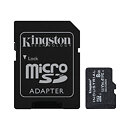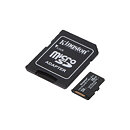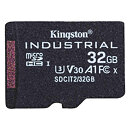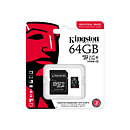- Joined
- Jul 1, 2014
- Messages
- 3,725 (0.94/day)
Kingston today made available its new Industrial microSD card lineup with a rated operating temperature of -40 °C to 85 °C, allowing normal operation even in "extreme desert heat and subzero conditions" based on the information provided by the company. The cards use TLC NAND in pSLC mode to provide transfer speeds of up to 100 MB/s, and are rated for endurance of up to 1920 TBW with 30K P/E cycles. There is a built-in feature set specific to endurance, performance and industrial needs. Kingston's Industrial microSD ships with a UHS-I SD adapter and is available in capacities from 8 GB-64 GB. Industrial features include bad block management, ECC engine, power failure protection, wear levelling, auto-refresh read distribution protection, dynamic data refresh, SiP - System in Package, garbage collection, and health monitoring.




View at TechPowerUp Main Site




View at TechPowerUp Main Site




 Looks so "professional".
Looks so "professional".